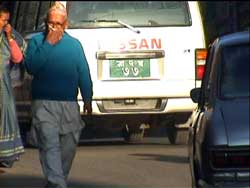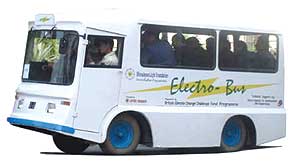 According to tourist surveys, pollution is the one reason visitors say that they will not return to Nepal, or recommend it as a destination. Respiratory disease in Nepal is critical, and a new Danish ESPS study shows that vehicular pollution is to blame. Kathmandu's pollution remains the worst in all of Asia.
According to tourist surveys, pollution is the one reason visitors say that they will not return to Nepal, or recommend it as a destination. Respiratory disease in Nepal is critical, and a new Danish ESPS study shows that vehicular pollution is to blame. Kathmandu's pollution remains the worst in all of Asia.
Despite this, the Ministry of Finance claims pollution has "nothing to do with lowered tourism or health issues" and wants to stop zero emission electric vehicles (EVs), fearing that they threaten the revenue-base of petrol and diesel vehicles. The public suspects it is not the formal revenues MOF is concerned about, but the lucrative informal revenues.
Safa EVs were introduced to help Nepal cope with rampant pollution. EVs capitalise on Nepal's hydropower, saving foreign currency, reducing fuel imports, improving environmental and health conditions, and creating thousands of jobs. Reduced tax facilities were offered for EVs and locally produced Safa tempos proliferated until the ban on registration of three wheelers.
The British and Swiss-supported "Electro-Bus" (a comfortable 15-seater), and the USAID supported Indian-American family electric car called "REVA," have arrived. Although more EVs would be a tremendous benefit for Nepal, the government's reaction is disgraceful and none of these vehicles have been allowed import into Nepal while the existing Electro-Bus from the Himalayan Light Foundation remains unregistered. Whatever excuses are given, the government and the diesel lobby are afraid EVs will make a real mark in the way Nepalis transport themselves. This fear is encouraging.
The Department of Transport claims that EVs cannot be registered due to lack of road capacity. Despite this "ban", hundreds of polluting vehicles and private cars are registered every month, including the recent Chinese diesel microbuses. Although 93 percent of battery waste comes from regular cars, trucks, and buses, EVs have been targeted as polluters.
Letters issued from the United States, the UK, Denmark, and Switzerland, all requesting the Ministry of Finance to assure the published 10 percent customs and 10 percent VAT rate and also offer the further reduced tax status for four-wheeled EVs that three-wheeled Safas now enjoy, go unanswered.
Despite a published tax facility of 10 percent customs and 10 percent VAT which spawned the private investment, the former Finance Minister impeded the REVA import process ordering customs to "take no action until next budget". The Indian Embassy also asked the MOF why it reneged on an internationally published facility for this Indian-American joint venture car, but the REVA cars are still blocked by the government at the border.
MOPE & MOF 
Despite significant financial support from donors, and formal requests to the government for better facilities, no MOF or Ministry of Population and Environment (MOPE) responses have come. The final blow came in this year's budget in which the MOF suddenly declared no reduced tax facility would be offered and that HMG/N would not even offer the already published promise of 10 percent VAT and 10 percent customs for the REVA. The result? REVA buyers will pay 140 percent tax making it unaffordable for Nepali people and REVAs may be sent back to India leaving Nepal in black smoke. The government is selling the breathing rights of the Nepalis based on erroneous if not nepotistic calculations.
Additionally, two Electro-Buses have been stuck at the Nepal border for six months in MOPE "red tape" with no chance for import. The MOPE has squashed the Electro-Bus file, which asks: "Should we allow an EV chassis to be imported for a local technology test eventually for local production?" Although the entire reason for the Electro-Bus project was to test the technology so it could be manufactured by our own Nepal industries creating thousands of jobs, MOPE has mired the project and has not informed the British and Swiss supporters nor the Himalayan Light Foundation of the reason. Is the diesel transportation lobby so strong that it has MOPE and the Ministry of Finance in the palm of its hand?
EVs can offer equal comfort and performance as polluting vehicles. When 600 diesel Vikrams were banned previously, there was an overnight improvement in air quality. Today the government still pays us to pollute by subsidising diesel and taxing us for traveling clean by imposing VAT and customs duties on EVs. Cash from diesel goes to black market racketeers (for fuel adulteration) while the financial liabilities of respiratory disease, decreased tourism and lack of Nepali jobs are borne by the public.
The public is rightfully wondering how the government can offer a published facility in the budget and then rescind it so casually as if the government's documents do not affect investment in the country. The government seems completely unconcerned about its reputation, and has already lost international credibility. This reversal of a published facility confirms investors' fears that Nepal is a bad investment destination.
The reversal of published incentives for the REVAs could well cause the collapse of the Eco-Visions (the REVA distributor in Nepal) and MOPE's refusal to allow the Electro-Bus into Nepal could cause the British Electro-Bus program to fold, ruining chances of additional aid. Meanwhile, officials are calculating figures based on suspect accounting, keeping the public in an ignorant cloud of smoke. The government must act quickly to allow EVs to proliferate, and must let them in with promised tax facilities and also give EV projects full cooperation while there is still air to preserve.
As a foreigner I feel deeply saddened when seeing HMG/N selfish opposition to a technology that is in the best interest of Nepalis. I feel even sadder that the citizens have to absorb the repercussions of these shortsighted decisions made based on an accounting that leaves the public out of the picture.
(Adam Friedensohn is founder of Lotus Energy and the Himalayan Light Foundation and past president of the Forum of International Investors of Nepal.)



